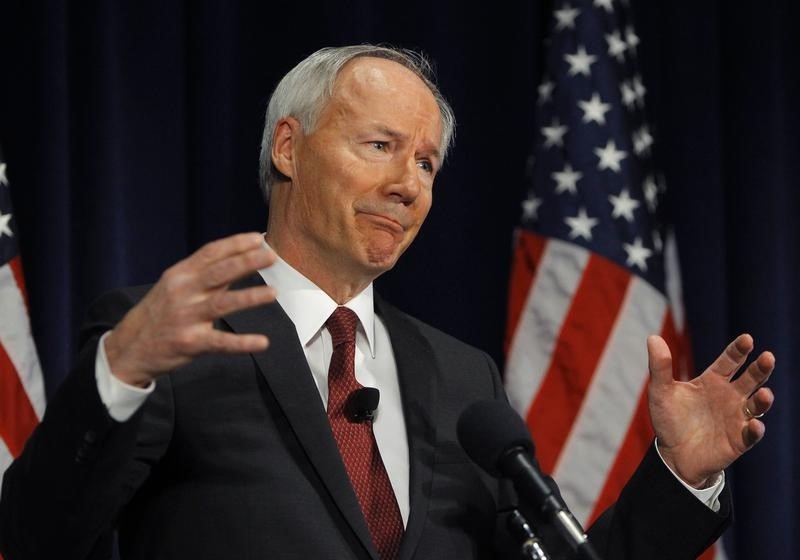By Steve Barnes
LITTLE ROCK, Ark. (Reuters) - Arkansas Governor Asa Hutchinson told lawmakers on Wednesday to revise a bill that rights activists and U.S. businesses said allowed discrimination against gays, and home-state corporate giant Wal-Mart Stores Inc (N:WMT) praised his action.
The state's Senate took up the challenge late on Wednesday, sending to the House of Representatives legislation that would bring the Religious Freedom Restoration Act (RFRA) into line with federal statutes. A House panel is due to take up that law on Thursday.
Indiana's governor a day earlier said lawmakers should fix a similar RFRA. After it was enacted last week, the state was hit with protests, threatened boycotts and warnings from powerful U.S. firms of pending economic damage for being seen as standing against U.S. ideals of inclusion.
In a news conference at the Capitol in Little Rock, Hutchinson, who previously said he would sign the bill, said he was sending the act back to the Republican-controlled legislature to be rewritten so it can better balance tolerance for diversity and protections of religious freedom.
"We want to be known as a state that does not discriminate, but understands tolerance," Hutchinson said. "We just didn't get it perfect through that legislative process."
The governor said his own son had asked him to veto it, adding a personal element to the pressure to reject the bill. While Hutchinson spoke, scores of protesters outside waved the rainbow flag of the gay rights movement.
Hutchinson, who is 64, recognized a generational divide over same-sex marriage.
"The issue has become divisive, because our nation remains split on how to balance the diversity of our culture with the traditions and firmly held religious convictions. It has divided families and there is clearly a generational gap on this issue."
A day earlier, Wal-Mart, the world's biggest retailer, called on Hutchinson to veto the bill. On Wednesday, it commended his decision and, in a Twitter post, urged lawmakers to "make certain any legislation does not encourage discrimination."
About 40 technology industry leaders, including the CEOs of Yelp (N:YELP), Twitter (N:TWTR), AirBnB, Cisco Systems (O:CSCO) and PayPal, joined the debate with a statement calling on state lawmakers to approve civil rights protections for members of the lesbian, gay, bisexual and transgender (LGBT) community.
In Indiana, Republican lawmakers met LGBT leaders to see how they could modify the new law to protect their community from potential discrimination. The rewritten law could be ready as early as Thursday, said Tory Flynn, spokeswoman for Indiana House Speaker Brian Bosma.
DAMAGE CONTROL
Twenty U.S. states and the federal government have RFRAs, which allow individuals to sue the government if they believe their First Amendment religious rights have been violated.
But those in Indiana and Arkansas go further than all but one of the state laws, allowing lawsuits between private parties. That raised the possibility that businesses such as florists could use the law as a defense if they are sued for refusing to provide services for same-sex weddings.
Texas is the only other state with a similar provision but its law contains language that it cannot be used to undermine civil rights, legal experts said.
Hutchinson said he was asking lawmakers to bring the Arkansas RFRA in line with the federal one, which does not include the language on lawsuits between private parties.
"If we fix it now, it is probably a week's worth of repairs to Arkansas' image. If we don't, it is a black eye that is going to be a long time healing, if ever," said Randy Zook, president and CEO of the Arkansas State Chamber of Commerce.
Critics see the crafting of the bills in Arkansas and Indiana as a push-back against the expansion of gay-marriage acts to most states last year.
Supporters of the Indiana and Arkansas bills argue that courts hearing religious freedom cases will ensure a balance is struck between religious freedom and anti-discrimination.
Jerry Cox, president of the Arkansas Family Council, which supported the state's bill, said he was disappointed.
"I fail to see why the bill needs to be amended. It's been thoroughly vetted," he said.
While Wal-Mart has pushed for a veto, Jim Walton, one of the world's wealthiest people and a member of the Walton family who own most of Wal-Mart's stock, have made contributions to the Council, public records show.

According to the National Institute on Money in State Politics, Walton family members have contributed $12,000 to Hutchinson and $75,000 to the Council since 2004.